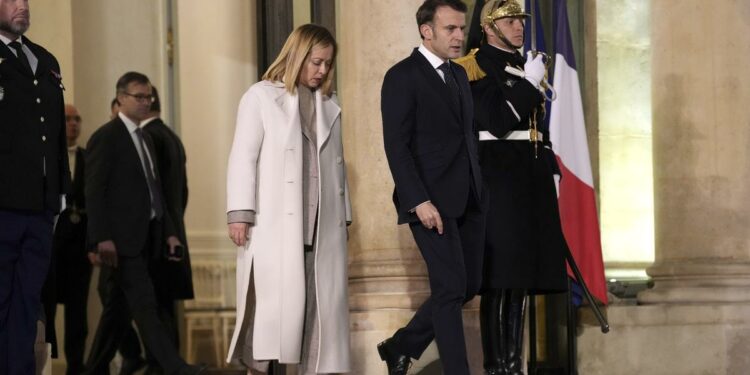French President Emmanuel Macron walks with Italy’s Prime Minister Giorgia Meloni as she leaves the Elysee Palace, after an informal meeting of leaders from key European Union nations and the United Kingdom, in Paris on February 17, 2025.
| Photo Credit: AP
European leaders failed to reach a joint position on whether they would send peacekeeping troops to Ukraine, after they discussed the issue of security guarantees for Ukraine and negotiations for an end to the Russia-Ukraine conflict at an emergency summit in Paris on Monday (February 17, 2025). The meeting, convened by French President Emmanuel Macron, was in response to U.S.-Russia talks in Riyadh which left Ukraine and the rest of Europe out of the negotiating room.
“We seek a strong and lasting peace in Ukraine. To achieve this, Russia must end its aggression, and this must be accompanied by strong and credible security guarantees for the Ukrainians,” said Mr. Macron, Ukrainian President Volodymyr Zelenskyy and U.S. President Donald Trump following the European meeting.
Mr. Macron said Ukrainians, Europeans and Americans would need to work on the issue together.
He also called on Europeans to invest in their security and defence. The U.K, Denmark, Germany, Italy, Poland, Spain, the Netherlands, NATO (the North Atlantic Treaty Organization) and the European Union were represented at Monday’s meeting.
After the meeting in Paris, German Chancelor Olaf Scholz said it was the wrong time to discuss security guarantees and that it was “highly inappropriate” to discuss peacekeeping troop deployments for Ukraine which was in the midst of a war. He said he had been “a little irritated” by the debate.
Mr. Scholz , who faces an election on February 23, said on social media site X that acting together and sharing risks underpinned NATO.
“There must be no division of security and responsibility between Europe and the USA.” he said.
Polish Prime Minister Donald Tusk said his country would not send troops to Ukraine.
Mr. Tusk also said that the transatlantic relationship (i.e., ties between the U.S. and Europe) had entered a new stage.
The current American position under Mr. Trump – that Europe spend more on its defence – was justified, Mr. Tusk said, emphasizing that Poland was leading in this regard. Poland spent more than 4% of its GDP on defence last year, with a planned figure of 4.7% this year, far higher than the 2% NATO guideline and higher than the U.S.
‘There must be a U.S. backstop’: Starmer
Prior to the Paris meeting, U.K. Prime Minister Keir Starmer had said the U.K. would be willing to deploy peacekeeping troops to Ukraine. Following the meeting, he emphasized that the U.K. would consider sending British troops to Ukraine, alongside others, if there was a lasting peace agreement.
“But there must be a U.S. backstop,” Mr. Starmer said, adding that a U.S. security guarantee was the only way to deter Russia from attacking Ukraine again.
He also called on Europeans to do more in terms of burden-sharing (in defence) with the United States.
On Monday, Swedish Prime Minister Ulf Kristersson said once the Russia-Ukraine was over, sending peacekeeping troops to Ukraine was “absolutely a possibility”.
Dutch Prime Minister Dick Schoof said Europeans need to decide on what they can contribute (to bringing peace in Ukraine) and they would eventually get a seat at the table. Mr Schoof said that “just sitting at the table without contributing is pointless” , according to the Associated Press.
Published – February 18, 2025 09:26 pm IST
Source link : http://www.bing.com/news/apiclick.aspx?ref=FexRss&aid=&tid=67b4afddf9da44a9aa5c8ff1a49ab12a&url=https%3A%2F%2Fwww.thehindu.com%2Fnews%2Finternational%2Feuropean-leaders-differ-on-peacekeeping-in-post-war-ukraine%2Farticle69234864.ece&c=16559919578106662648&mkt=en-us
Author :
Publish date : 2025-02-18 07:56:00
Copyright for syndicated content belongs to the linked Source.



